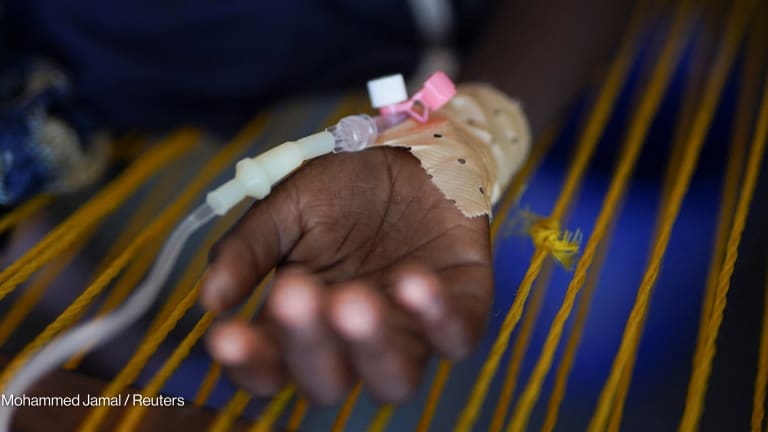
Six years ago this month, a devastating earthquake ravaged Haiti. One of the quake’s most tragic consequences was the largest outbreak of cholera in recent years. To date, nearly 800,000 Haitians have been infected with cholera, and 9,000 have died from the disease. Many argue that hundreds of lives could have been saved if cholera vaccines had been readily accessible.
Cholera has affected vulnerable populations for centuries: Each year, 3 million people are infected and over 100,000 succumb to the disease, the majority from low-income countries. Despite this, the global health community has made strides against the disease, by improving sanitation and investing in vaccine development.
And this week, we’ve reached an important milestone: a second low-cost cholera vaccine producer has been prequalified by the World Health Organization — a move that’s set to double the number of available, affordable doses worldwide and address serious global supply shortages. Funding from Gavi, the Vaccine Alliance will enable the stockpile to be used by eligible countries through 2018.
A few years ago, when the first cholera vaccine was approved, a number of international organizations quickly came together to establish a 2 million dose global vaccine stockpile. This stockpile was designed to help countries experiencing or at high risk of outbreaks, easily access the doses of the vaccine needed, and prevent what happened in Haiti from repeating itself in other parts of the world.
In its first year, the stockpile was used to distribute 1.5 million doses of the vaccine in six countries, both to respond to outbreaks and prevent cholera in a high-risk areas. In South Sudan, ongoing conflict had forced tens of thousands of people to seek refuge in internally displaced persons camps. Conditions in the camps were poor and access to clean water was severely limited, which created an environment where cholera could thrive. Cholera vaccines from the stockpile were used pre-emptively, and when an outbreak appeared in the country a few months later, camp residents were largely protected from the disease. To date, 3.3 million stockpile doses have now been used in multiple countries including Haiti, Malawi, Iraq, Guinea, Cameroon, Nepal and Tanzania.
Increased access to clean water and sanitation services have also been critical in these situations and will continue to be critical in preventing the spread of the disease. Stopping cholera in the near-term though, requires investment in vaccines as well.
The latest vaccine, called Euvichol, produced by Eubiologics in South Korea, was developed in partnership with the International Vaccine Institute, also based in South Korea. It is the first vaccine produced in the country for global health purposes, a noteworthy contribution that demonstrates the unique power of diverse partnerships to successfully develop, manufacture and distribute vaccines.
The Euvichol financing represents an innovative collaboration among an international consortium of public, private and nonprofit organizations. Structured by JPMorgan Chase & Co. and the Bill & Melinda Gates Foundation, the Global Health Investment Fund is a private investment fund designed to finance late-stage technologies for diseases that disproportionately burden low-income populations.
Now that the Euvichol cholera vaccine has been approved, the next steps are critical: Produce enough of the vaccine to meet demand and get it to the people who need it most. This means that manufacturers will need to quickly and efficiently produce a large number of doses. The WHO, which has already received numerous requests for the vaccine, must in turn be ready to approve requests once the stockpile is replenished. Finally, partners will need to work with governments in outbreak and high-risk countries to ensure that the vaccine is made available to all who are at high risk of contracting the disease.
It’s clear that vaccinations, along with improved hygiene and sanitation, will be vital to prevent future outbreaks. As the risk of the disease rises in some areas due to growing refugee populations and shifting weather and climate patterns, it will be essential for all partners involved to remain committed and follow through on their promises to protect vulnerable populations from cholera and ensure that communities can thrive without fear of a cholera outbreak.
To read additional content on global health, go to Focus On: Global Health in partnership with Johnson & Johnson.








